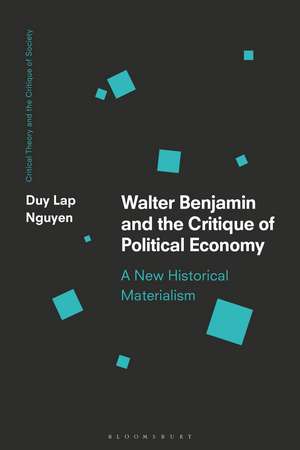Walter Benjamin and the Critique of Political Economy: A New Historical Materialism: Critical Theory and the Critique of Society
Autor Duy Lap Nguyenen Limba Engleză Paperback – 20 mar 2024
| Toate formatele și edițiile | Preț | Express |
|---|---|---|
| Paperback (1) | 193.18 lei 6-8 săpt. | |
| Bloomsbury Publishing – 20 mar 2024 | 193.18 lei 6-8 săpt. | |
| Hardback (1) | 541.44 lei 6-8 săpt. | +117.07 lei 4-10 zile |
| Bloomsbury Publishing – 10 aug 2022 | 541.44 lei 6-8 săpt. | +117.07 lei 4-10 zile |
Preț: 193.18 lei
Preț vechi: 250.34 lei
-23% Nou
Puncte Express: 290
Preț estimativ în valută:
36.96€ • 38.70$ • 30.59£
36.96€ • 38.70$ • 30.59£
Carte tipărită la comandă
Livrare economică 08-22 aprilie
Preluare comenzi: 021 569.72.76
Specificații
ISBN-13: 9781350331051
ISBN-10: 1350331058
Pagini: 312
Dimensiuni: 156 x 234 x 25 mm
Greutate: 0.43 kg
Editura: Bloomsbury Publishing
Colecția Bloomsbury Academic
Seria Critical Theory and the Critique of Society
Locul publicării:London, United Kingdom
ISBN-10: 1350331058
Pagini: 312
Dimensiuni: 156 x 234 x 25 mm
Greutate: 0.43 kg
Editura: Bloomsbury Publishing
Colecția Bloomsbury Academic
Seria Critical Theory and the Critique of Society
Locul publicării:London, United Kingdom
Caracteristici
Connects Walter Benjamin's early philosophical writings on history to his later incorporation of Marx and materialism
Notă biografică
Duy Lap Nguyen is Assistant Professor in the Department of Modern and Classical Languages at the University of Houston, Texas, USA.
Cuprins
Acknowledgements 1. Introduction 2. Messianism and Mechanical Time in Benjamin's Early Writings3. Capitalism, Property and the State in Benjamin's Early Writings4. Between Marx and Fourier5. Benjamin and Bataille: Sovereignty and Mass Reproduction 6. Capitalism and Primal History in the Arcades Project 7. ConclusionIndex
Recenzii
In Water Benjamin and the Critique of Political Economy, Duy Lap Nguyen shows how Benjamin in his later work appropriates a Marx unsuspected by orthodox Marxists, one whose conception of historical time is no less messianic than dialectical. Through wide-ranging and detailed analyses, he demonstrates the fundamental consistency of this new, allegorically framed historical materialism in Benjamin with the earlier metaphysical anarchism that is understood to culminate in the 1928 Trauerspiel book.
In a challenge to the dualism, sustained by many scholars and intellectual historians, opposing an earlier, pre-Marxist and Neo-Kantian Benjamin to the later, militantly anti-fascist but unorthodox historical materialist, Duy Lap Nguyen here argues the case for an ultimate, authorial will to synthesis, albeit one decisively mediated by Benjamin's often startlingly contemporary understanding of Capital and Marx's mature critique of political economy. In this way he comes as close as anyone has to presenting us with a Benjaminian opus adequate to the contemporary, acute crisis of capitalism. Along the way, Nguyen likewise educates both new and veteran students of Benjamin with careful and often novel interpretations of most of the major and many of the author's lesser-known works and, for example, recapitulates for explanatory as well as critical purposes the nineteenth century neo-Kantianism of now often forgotten philosophical and political sources of influence and authority (e.g., the Marburg School) over the revisionist European Social Democracy against which not only Benjamin but contemporaries such as Lukács and Ernst Bloch were at pains to redefine themselves, thereby helping to inaugurate modern 'western Marxism' in the process. This is a work of careful and often exhaustive scholarship.
In a challenge to the dualism, sustained by many scholars and intellectual historians, opposing an earlier, pre-Marxist and Neo-Kantian Benjamin to the later, militantly anti-fascist but unorthodox historical materialist, Duy Lap Nguyen here argues the case for an ultimate, authorial will to synthesis, albeit one decisively mediated by Benjamin's often startlingly contemporary understanding of Capital and Marx's mature critique of political economy. In this way he comes as close as anyone has to presenting us with a Benjaminian opus adequate to the contemporary, acute crisis of capitalism. Along the way, Nguyen likewise educates both new and veteran students of Benjamin with careful and often novel interpretations of most of the major and many of the author's lesser-known works and, for example, recapitulates for explanatory as well as critical purposes the nineteenth century neo-Kantianism of now often forgotten philosophical and political sources of influence and authority (e.g., the Marburg School) over the revisionist European Social Democracy against which not only Benjamin but contemporaries such as Lukács and Ernst Bloch were at pains to redefine themselves, thereby helping to inaugurate modern 'western Marxism' in the process. This is a work of careful and often exhaustive scholarship.










